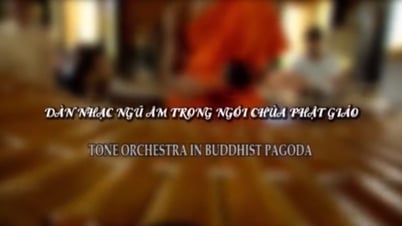( Quang Ngai Newspaper) - In the past, to maintain order and discipline in society, each village and locality had regulations with many strict forms of punishment, especially for corruption.
Form of punishment of village custom
Village rules are written into village covenants that record the terms and conditions to suit each locality. Depending on the level of violation, the village will have different forms of punishment. For villagers, anyone who harbors criminals, thieves, robbers, or who damages the village's reputation to the point of having to sue will be fined money or in kind such as buffalo, pigs, chickens, betel, and wine, called "fine". There are also cases where the village forces the violator to pay a sum of money, then all the men in the village come to the house to "extort", and the guilty person must pay the cost.
 |
| Ancient officials judging cases. PHOTO: TL |
Anyone who harms the rights and property of others as well as the village must compensate for the damage. If they do not pay the fine, they will be punished more severely. The ancients often punished with whipping to make the offender "remember the painful blow for life", whipping in the communal house yard to deter others. For commoners, they were whipped 30 times, and those with high positions in the village who acted recklessly would be fined, whipped 50 times and demoted depending on their qualifications and age, thereby losing the rights and honor of the village.
The most severe punishment was “expulsion from the village” for the following crimes: being unfilial to parents, embezzling public funds, dodging military service and not taking responsibility, and abusing power to demand and harass villagers. For the ancient Vietnamese, the village was everything, the village was a place with fields and gardens. In the village, in addition to brotherly and kinship feelings, there was also neighborly feelings. They were not only guaranteed rights by the village regarding population, public land, gifts, and position in the village, but also cared for and helped by the villagers in times of difficulty.
The village's punishments were lighter than those prescribed by feudal state law, as evidenced by the fact that the village's rules did not have the highest form of punishment being the death penalty. Village rules were enacted to maintain order and discipline in the village. However, the village rules of the ancients also had many harsh things, causing hardship and suffering to the villagers.
Dealing seriously with corruption
For corrupt officials, depending on the level of violation, feudal dynasties issued penal laws to adequately deter them. The book "Dai Viet Su Ky Toan Thu" recorded: Under the reign of King Le Thanh Tong, during his 37-year reign (1460 - 1497), 10 edicts were issued to inspect and punish state officials who violated the crime of corruption. In 1483, amnesty was granted for many types of crimes, but corruption was classified as a major offense and was not eligible for leniency. The Hong Duc Code (National Penal Code) under King Le Thanh Tong dealt very severely with embezzlement. Article 38 of the code stipulated: "Corrupt officials who embezzle from 1 to 9 quan of money will be dismissed from office; from 10 to 19 officials will be beaten with sticks and exiled; from 20 officials or more will be beheaded."
During the Nguyen Dynasty, there was a set of "Hoang Viet Luat Le" issued under the reign of King Gia Long, also known as Gia Long Law, which mentioned many forms of punishment for corruption. Gia Long Law had 398 articles, of which 79 articles specifically regulated corruption crimes. Article 31 of the law stipulated that officials who accepted bribes would be subject to the lowest penalty of 70 lashes, the highest being hanging. Regarding embezzlement, Article 392 stipulated: "Anyone who uses embezzlement tricks, steals salaries, warehouse supplies as well as forges materials and brings them home, if the seized goods are worth up to 40 taels, will be beheaded". In the 17th year of Gia Long, an edict was issued: "Phan Tien Quy is a forest supervisor who has embezzled money from the people, the number of people who have been found is very large, his crime deserves to be punished with hanging and executed immediately. It was also passed down to all cities, businesses, towns, prefectures, and districts to serve as a warning".
In the third year of Minh Mang (1822), the Ministry of Justice reported the verdict on the case of Le Van Le, the captain in charge of the Da Nang seaport, for corruption. The decree said: "Le Van Le should follow the law, calculate the amount of evidence of more than 4 taels of silver, divide it in half, and punish him with 100 lashes, remove him from office, and have his name removed from the register and not be employed again." Or the verdict on the case of the official of the Ministry of Internal Affairs, Ly Huu Diem, who was discovered stealing more than one tael of gold, and brought it to the Ministry of Justice for deliberation. The Ministry of Justice sentenced Huu Diem to exile. But King Minh Mang decreed that now Huu Diem dared to openly steal a pound of gold, and ordered him to be immediately taken to Dong Ba market to be beheaded to deter others who intended to commit crimes.
During the reign of Tu Duc, in December 1854, when the Chinese merchant Chu Trung sent a petition denouncing many local officials for taking bribes from foreign merchant ships, the king immediately sent the Inspectorate to Quang Nam to investigate and clarify the matter. According to the Gia Long Law, 17 people were sentenced to hanging, 25 were exiled, 12 were sentenced to forced labor, 8 were punished with beatings and dismissed from office...
VO MINH TUAN
RELATED NEWS:
Source
































![[Photo] Prime Minister Pham Minh Chinh receives leaders of several Swedish corporations](https://vphoto.vietnam.vn/thumb/1200x675/vietnam/resource/IMAGE/2025/6/14/4437981cf1264434a949b4772f9432b6)





































































Comment (0)